Mahmoud Abbas is increasingly unpopular with Palestinians as they lose hope for an independent state
Fifteen years ago this week, Mahmoud Abbas was elected as the second president of the Palestinian Authority (PA).
Abbas took office a few months after the death of his predecessor, Yasser Arafat, and following what was viewed as a fair and free election, approved by hundreds of international observers led by former US president Jimmy Carter and former Swedish prime minister Carl Bildt.
Hani al-Masri, director-general of the Masarat Center for Policy Research in Ramallah, told The Media Line that Abbas took over a presidency facing many challenges.
“Without a doubt, President Abbas inherited a very heavy legacy,” Masri said.
“President Yasser Arafat was not just a… president, but a historic leader, and his loss left a great void that was difficult to fill, either by one person or by several, especially in light of the fact that the Palestinian establishment was not in the best condition [and] was not a strong institution that was able to fill the void,” he explained.
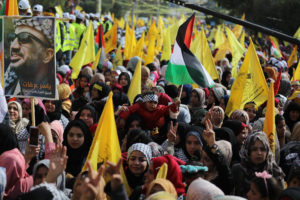
Gone but hardly forgotten. Supporters of the Fatah movement in Gaza carry a portrait of Yasser Arafat on January 1 to commemorate 55 years since the party’s founding. (Majdi Fathi/NurPhoto via Getty Images)
Masri says that unlike his predecessor, Abbas has pursued a “negotiations only” strategy.
“The main difference is that Abu Ammar dealt with the peace process and negotiations as a policy option,” he said, using Arafat’s nom de guerre. “It could be tried, and if it did not succeed, another policy could be adopted, while President Abbas has treated it [the peace process] as an ideology and as a one-way ticket that is not subject to change. If negotiations fail, he will negotiate further.”
During the early days of Abbas’s presidency, almost two-thirds of Palestinians believed in him. They overwhelmingly and enthusiastically supported him, something that hitherto had been reserved for the man he succeeded.
Jihad Harb, a political analyst who writes for several Palestinian media outlets, told The Media Line that at the time, people were excited and talking of a new era.
“For the first year after the election of President Abbas, it was clear that the [PA’s] political system was heading toward a democratic system that accepted criticism, and that there were practices in place signaling a modern, democratic system,” Harb said.
The optimism did not last long, and Khalil Shikaki, director of the Palestinian Center for Policy and Survey Research, told The Media Line that Abbas’s approval rating has nose-dived over the past few years.
“The most dramatic change during the last 15 years is the decline in Abbas’s popularity and the loss of credibility and trust that he suffered during those years. His popularity in the early years after he was elected was relatively high – in fact, very high.”
When Abbas took office, the Palestinians were coming out of the Second Intifada, an especially violent uprising against Israel that erupted during Arafat’s time.
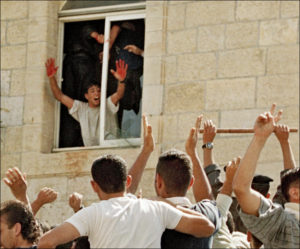
A Palestinian youth proudly shows blood on his hands after the lynching of two Israeli army reservists in October 2000, at the beginning of the Second Intifada. (Chris Gerald/AFP via Getty Images)
“It was a different kind of resistance, an uprising that saw Palestinian factions resort to the use of arms against Israeli occupation of the West Bank,” Masri related.
Abbas was against the use of suicide bombings and live ammunition – which Israel met with even deadlier force – and did not hide his feelings.
The Second Intifada ended with about 3,200 Palestinian and 1,000 Israeli deaths.
Newly elected, Abbas quickly went to work on implementing his own vision. He strongly believed that giving up on armed resistance and publicly denouncing it would eventually lead to the establishment of an independent Palestinian state.
Munir al-Jaghoub, who head’s Fatah’s Information Department in the Office of Mobilization and Organization, supported this – and remains committed to this view.
“What did the armed struggle that we announced in 1965 achieve? The Oslo peace agreement… returned half a million Palestinians home, while all of Hamas’s rockets cannot return one Palestinian to Gaza or allow one to leave,” he told The Media Line.
Shikaki says that Palestinians, exhausted after years of violence, welcomed peace efforts, but when talks collapsed, people started to have their doubts.
“Many Palestinians concluded later that giving up the armed resistance was a mistake, and it had weakened their position at the negotiating table,” Shikaki said.
Masri believes that Abbas’s lack of a contingency plan encouraged Israel to pursue an aggressive policy in the Palestinian territories, making the PA leader look helpless and ineffective.
“President Abbas tried the path that brought us to the situation we are in, and no one is pleased with it,” he stated. “The Palestinian issue has gone backward; settlement activity is widespread.”
Shikaki, whose polls in the West Bank and Gaza Strip are considered among the most accurate, says people are interested in results, and Abbas has not been able to show any.
“He did a lot of things toward gaining international recognition for the Palestinians starting in 2011,” he said referring to the PA’s bid for full UN membership. “However, the flip side of it is that most Palestinians believe this internationalization of the conflict has been a failure. In a sense, it didn’t deliver. It didn’t influence the Israeli calculus in any effective way to stop settlements or contribute to ending the Israeli occupation.”
Shikaki argues that this failure has led many to question Abbas’s ability to negotiate with Israeli officials.
“People say he’s not strong enough, he’s not capable enough… that essentially he’s a man of a peace who in the eyes of the Palestinians is the most dovish Palestinian leader you can ever have, and yet he fails to reach the Israelis,” he continued. “He fails to make peace or progress… and… he doesn’t reach the right conclusions based on that.”
An intra-Palestinian honeymoon lasted but one year.
In 2006, Hamas, the main opposition to Abbas’s Fatah movement, won the election for the Palestine Legislative Council (PLC). The Islamist group’s victory stunned Abbas – and the entire world. To his credit, however, he did not object to Hamas forming a government headed by one of its leaders, Ismail Haniyeh.
A year later, though, the group violently took over the Gaza Strip from Abbas’s people, expelling his security forces. The move created a geographic and political division among Palestinians. It considerably weakened Abbas’s authority and shrank his control over Palestinian territory and people.
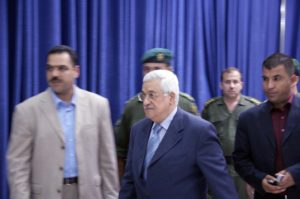
Looking haggard, PA President Mahmoud Abbas attends a meeting in Ramallah of the Central Council of his Fatah party in June 2007, a week after Hamas took over the Gaza Strip. (Omar Rashidi/Palestinian Press Office – handout via Getty Images)
Jaghoub remains dismissive of Hamas.
“I say that the peace approach achieved something, while the Hamas approach has done nothing. The Gaza they govern, they took from the PA. They cannot liberate a single inch from Israel,” he stated.
Yet Masri says Hamas’s takeover – what Abbas calls the “coup” – affected the PA leader in a major way. The circle of advisers around him withered, and decision-making basically became his alone, with assistance from some advisers.
“This led to a marked weakening of Palestinian institutions, which in the end meant we no longer had a legislative council,” Masri explained, noting that Abbas dissolved it because Hamas was in the majority.
“Very harsh measures were taken with regard to the judiciary,” he went on. “The PLO was largely deprived of its role, and its Executive Committee became [merely] an advisory body.”
This concentration of power led to harsh criticism of Abbas both domestically and internationally. His associates started to suppress the opposition, and his security apparatus employed an iron fist to silence dissent, arresting journalists and critics alike.
Nashat al-Aqtash, a media professor at Birzeit University, near Ramallah, says Abbas’s aim was to quell dissent, including through the use of torture, crushing any chance for a democratic future for the Palestinians – unless change happens soon.
“President Abbas rules like a king,” Aqtash said. “The powers of the president exceed those of kings. The laws promulgated by decree by the president outnumber the legislative laws the PLC approved in the past 25 years.”
But Fatah’s Jaghoub begs to differ. He points first to the UN.
There are many tangible achievements in the era of President Mahmoud Abbas, including Palestine joining the United Nations. Palestine became state number 194. It is true that it is not a full membership, but it is nevertheless an achievement,” he told The Media Line.
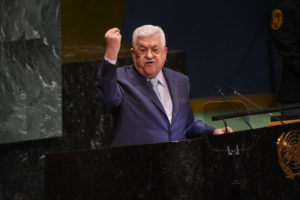
Mahmoud Abbas addresses the UN General Assembly in September 2018. (Stephanie Keith/Getty Images)
“Palestine signed many international agreements and joined many international organizations, including the International Criminal Court,” he went on. “President Abbas invested in Palestinian institutions and set the course for them, and put an end to [official] appointments based on personal relations and kinship.”
What’s more, Jaghoub denies that Abbas acts like an autocrat.
“President Abbas is not alone in the Palestinian decision-making process,” he said. “The president gives way to others when making decisions. There is the PLO, there is a Palestinian leadership, and he meets and consults with all.”
In September 2019, Abbas – not for the first time – called for presidential and parliamentary elections. So far, no date has been set, and it is unclear whether he intends to seek re-election.
Harb says the absence of elections has undermined the PA’s standing worldwide.
“The international community,” he said, “wants to be able to deal with elected people and representatives of the people.”
It is the loss of support domestically, however, that has most damaged Abbas – and most bothers him. He feels that no matter what he does, he can never satisfy the people.
Insiders tell The Media Line that he despises being compared to Arafat. Only reluctantly does he commemorate the anniversary of his predecessor’s death. He has sidelined almost all of Arafat’s advisers and surrounded himself with a small coterie of yes-men.
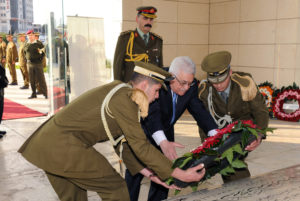
Reluctant mourner? Mahmoud Abbas (center) lays a wreath on the grave of Yasser Arafat on November 6, 2011, in Ramallah. (Thaer Ghanaim/PPO via Getty Images)
Contributing to his drop in domestic support is the belief among many Palestinians that his policies make life easier for Israel. As a result, Masri says, Israeli leaders are interested in maintaining the status quo.
“The policies he has pursued have not helped… prevent [intra-Palestinian] divisions or restored unity,” he told The Media Line, explaining that by following another policy, he might have “strengthened the PA’s cards, allowing it to negotiate from a stronger position.”
Initially, the Palestinian public supported Abbas’s efforts to take their cause to the international community. He has always said that building Palestinian institutions, coupled with support from the European Union, Russia, China and other global powers, will lead to the establishment of an independent Palestinian state with East Jerusalem as its capital.
Masri says these efforts have failed.
“This policy has led to no result, a one-choice policy. You always have to hold doors open for multiple options and be prepared to use them,” he opined.
Several officials in Ramallah who are extremely close to Abbas describe him as an “angry” man. They draw a picture of a leader who is “stubborn” and set in his ways.
An adviser who asked not to be identified told The Media Line that Abbas has grown more and more frustrated over the years, and does not allow for much disagreement or criticism.
“If you want to stay connected and have a job, and not be marginalized, then you have to draw a rosy picture for Abbas of what is happening in the Palestinian territories as a result of his policies,” the adviser said.
Abbas once fired this person. He said he pleaded to have his job back, promising absolute loyalty. It took the intervention of many to persuade the president to rehire him.
“He is a vengeful, malicious man who demands complete submission from those around him,” the adviser claimed.
Aqtash says that Abbas fosters the impression that opposing him is pro-American and goes against the Palestinian national project.
“He regards anyone who opposes his policies as a traitor,” he told The Media Line.
Abbas had high hopes for US President Donald Trump. He believed that President Trump had what it would take to restart the peace process with Israel.
Yet the US leader’s recognition of Jerusalem as the capital of Israel in December 2017 infuriated Abbas, who called it a “betrayal.” The PA president subsequently decided to boycott the Trump Administration and has rejected the US as a sole mediator for the Israeli-Palestinian conflict.
Masri says this was not an easy decision, insisting that Abbas should be applauded for it.
“The most important thing that President Abu Mazen [Abbas] did was say no to Trump’s deal,” he stated, referring to the peace plan, whose diplomatic components have yet to be unveiled. “This shows him taking a brave stand. It would be a difficult thing for a Palestinian president to accept the liquidation of the Palestinian issue.”
Abbas recently celebrated his 85th birthday at home in Ramallah, surrounded by his family. A heavy smoker, it is no secret that he suffers from several illnesses. On top of this, a power struggle is already underway among Fatah officials, with each jockeying for position in the post-Abbas era.
According to several high-ranking Palestinian figures in the West Bank who spoke to The Media Line on condition of anonymity, these officials are purchasing and stockpiling weapons with an eye toward the uncertainty of life after Abbas.
“There are different wings,” one explained. “There are those who want to nominate the president [for re-election] because the presence of the president allows them to maintain their positions, interests and influence, [which] can be expanded as well. [This is because they have no competitive candidate [to put forward in his place].”
According to Aqtash, Abbas’s failure to choose a deputy was a colossal mistake that will lead Palestinians into the unknown.
“It will be dangerous if the position of president becomes vacant because we will enter into a conflict,” he explained.
Harb agrees, saying this failure, and the lack of a clear plan, might have catastrophic consequences.
“It could lead to chaos and disputes that turn into armed conflicts, especially in light of the division [between Fatah and Hamas],” he noted.
There is no clear front-runner to succeed Abbas among Palestinian officials in the West Bank. According to Shikaki, the most popular candidate sits in an Israeli prison.
“There’s no doubt that there is one Palestinian leader today who is more popular than Abbas or any other Palestinian leader you can think of, and that is Marwan Barghouti,” he stated.
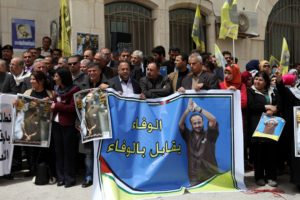
Palestinians rally in Ramallah in April 2015 to demand the release of Fatah leader Marwan Barghouthi, shown in prison garb and a defiant pose on a poster they are holding. (Shadi Hatem/Anadolu Agency/Getty Images)
Barghouti, 60, is a leader in Fatah. He is a member of its Central Committee. But he has been in an Israeli jail cell since 2002, convicted of murder in connection with five deaths linked to the Second Intifada, and serving five life sentences.
“To Israelis, he’s a terrorist,” Shikaki said. “To Palestinians, he’s a national hero, not only because he defended Palestinian rights, but because he is seen as incorruptible, a unifier, a democrat, as someone who will be more credible in challenging the Israelis to build a Palestinian state alongside the State of Israel.”
Many Palestinians say it is high time for Abbas to hand the reins over to the younger generation.
Jaghoub disagrees.
“We in the Fatah movement,” he said, “are determined to nominate Abbas as our candidate.”